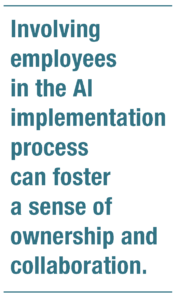Introduction
Artificial Intelligence (AI) is revolutionizing the business landscape, offering unprecedented opportunities for higher employee productivity, innovation, and growth. However, as businesses increasingly integrate AI into their operations, they face the critical challenge of balancing the benefits of automation with ethical considerations. This article delves into the complexities of AI-driven business transformation, exploring how companies can effectively leverage AI for automation to boost employee productivity while maintaining ethical standards and ensuring employee engagement.
Understanding AI-Driven Business Transformation
The Impact of AI on Business Operations
AI’s impact on business operations is profound and far-reaching. AI transforms industries by optimizing processes, enhancing decision-making, and driving innovation. In manufacturing, AI-powered robots and automation systems handle complex assembly lines with precision and speed, resulting in increased employee productivity and significant cost savings. For instance, AI systems can monitor production lines in real-time, predicting maintenance needs and reducing downtime, ultimately enhancing operational efficiency.
In the finance industry, AI algorithms analyze vast amounts of data to detect fraud, optimize investment strategies, and provide personalized financial advice. AI-driven systems can process transactions faster and more accurately than humans, improving customer experiences and reducing operational risks. Moreover, AI’s predictive analytics capabilities enable businesses to anticipate market trends and make data-driven decisions, giving them a competitive edge.
AI Tools and Technologies in the Workplace
AI is being applied across various business functions, revolutionizing tasks. AI-driven tools assist recruitment by screening resumes and identifying the best candidates based on predefined criteria. AI speeds up the hiring process and reduces biases associated with human decision-making. Additionally, AI can help HR departments manage employee performance and engagement by analyzing feedback and identifying areas for improvement.
Customer service is another area where AI is making significant strides. AI-powered chatbots, equipped with natural language processing (NLP) capabilities, can handle a wide range of customer inquiries, providing instant support and resolving issues efficiently. These capabilities improve customer satisfaction and allow human agents to handle more complex and high-value interactions.
Balancing Automation with Human Expertise
AI’s strength lies in its ability to handle tasks involving large-scale data analysis, pattern recognition, and routine processes. However, human workers bring unique qualities, such as creativity, emotional intelligence, and critical thinking. For example, in healthcare, AI can analyze medical images with high accuracy, identifying potential health issues that human eyes might miss. Yet, the interpretation of these results, making nuanced decisions, and providing compassionate care are tasks that require human expertise.
In the creative industries, AI can assist in generating content, such as writing articles, creating music, or designing graphics. However, human creativity and intuition are essential for producing work that resonates emotionally and meets specific client needs. Thus, integrating AI and human skills leads to a symbiotic relationship where both entities enhance each other’s capabilities.
Optimizing Integration for Best Outcomes
Businesses must strategically integrate AI into their workflows to achieve the best outcomes. AI supports identifying tasks best suited for automation and those requiring human intervention. For instance, in customer service, AI can handle routine inquiries, such as checking account balances or resetting passwords. At the same time, human agents focus on resolving complex issues and building relationships with customers.
Training and reskilling employees are crucial for optimizing AI integration. As AI takes over repetitive and mundane tasks, employees can be redeployed to roles that require higher-level skills and creativity. Companies should invest in continuous learning programs to equip employees with the skills to work alongside AI that not only enhances the overall productivity of the workforce but also boost employee morale and engagement.
Challenges and Solutions in Integration
Apart from the persisting challenges of how to achieve transformation excellence and increase the maturity of enterprise project management functions to maximize success, there are AI-specific questions companies are all engaged in addressing: embedded bias, hallucinations, use of synthetic data, explainability, data privacy, and cybersecurity — all of which have significant implications for customers and employees. Not to mention the classic transformation challenge of culture change, which will likely be even more of an issue with the most experienced teams. 1
Integrating AI into existing workflows can present technical and cultural challenges. Employees may resist change due to fears of job displacement and uncertainty about the future. To address these concerns, companies should prioritize open and transparent communication about AI’s benefits and limitations. Involving employees in the AI implementation process can foster a sense of ownership and collaboration.
Technical challenges like data integration and system compatibility can also hinder AI adoption. Businesses should invest in robust IT infrastructure and collaborate with technology partners to ensure seamless integration. Additionally, adopting an iterative approach to AI implementation, starting with pilot projects and gradually scaling up, can help identify and address issues early on.
Ethical Considerations in AI Adoption
Transparency and Fairness in AI Systems
Ensuring transparency in AI systems is essential for building trust and avoiding biases. AI algorithms should be explainable and understandable, allowing stakeholders to comprehend how decisions are made. For example, if an AI system is used for hiring, how candidates are evaluated and selected should be clear to avoid biases that could lead to discrimination.
Regular audits and evaluations of AI systems are necessary to detect and mitigate biases. Businesses should establish clear criteria for evaluating the fairness of AI algorithms and involve diverse teams in the development and testing process. Companies can ensure that AI systems operate fairly and equitably by promoting transparency and accountability.
Privacy and Data Protection
AI relies heavily on data, raising concerns about privacy and data security. Businesses must implement robust data protection measures to safeguard sensitive information. Prevention includes encrypting data, using anonymization techniques, and ensuring compliance with data protection regulations such as the General Data Protection Regulation (GDPR).
Employees and customers should be informed about how their data is used and have control over their personal information. Companies should adopt transparent data practices, providing clear and concise information about data collection, usage, and storage. Building a culture of data privacy and security is essential for maintaining trust and ensuring the ethical use of AI.
Establishing Ethical AI Guidelines
Developing and enforcing ethical AI guidelines is crucial for responsible AI adoption. These guidelines should cover data usage, bias mitigation, and accountability. Companies should establish an ethical framework that aligns with their values and business goals.
Leadership plays a vital role in promoting ethical AI practices. Executives and managers should lead by example, prioritizing ethical considerations in AI initiatives and decision-making processes. Establishing an ethics committee or advisory board can provide oversight and guidance on AI-related ethical issues.
Here are seven steps toward building a customized, operationalized, scalable, and sustainable data and AI ethics program.
- Identify existing infrastructure that a data and AI ethics program can leverage.
- Create a data and AI ethical risk framework tailored to your industry.
- Change how you think about ethics by taking cues from the successes in other sectors.
- Optimize guidance and tools for product teams.
- Build organizational awareness through training and upskilling employees
- Formally and informally incentivize employees to play a role in identifying AI ethical risks.
- Monitor impacts and engage stakeholders. 2
Maintaining Employee Engagement and Morale
Addressing Employee Concerns
Employees may have concerns about AI’s impact on their job security and roles. It is important to address these concerns through transparent and empathetic communication. Companies should explain how AI will be used, its benefits, and the opportunities it presents for career growth.
Involving employees in the AI implementation process can foster a sense of ownership and collaboration. By soliciting feedback and involving employees in decision-making, companies can build trust and ensure that AI is seen as a tool for empowerment rather than a threat.
Fostering a Positive Work Environment
A positive work environment that encourages continuous learning and development is essential for maintaining employee engagement. Companies should provide training programs to help employees acquire new skills and adapt to changing roles. Offering opportunities for career advancement and professional growth can boost morale and motivation.
Recognizing and rewarding employee contributions is essential for maintaining a positive work environment. Celebrating successes, acknowledging hard work, and providing constructive feedback can enhance employee satisfaction and foster a culture of appreciation and respect.
Leveraging AI for Employee Well-Being
AI can also enhance employee well-being. AI-driven tools can help monitor and manage workloads, preventing burnout and promoting work-life balance. For example, AI can analyze work patterns and suggest optimal schedules to ensure employees have adequate rest and recovery time.
Personalizing employee experiences through AI insights can increase job satisfaction and retention. AI can provide tailored recommendations for career development, training opportunities, and wellness programs based on individual preferences and needs. By leveraging AI to support employee well-being, companies can create a healthier and more productive work environment.
Enhancing Employee Productivity with AI
AI can significantly enhance employee productivity by automating routine and time-consuming tasks. For example, AI-powered virtual assistants can handle administrative tasks such as scheduling meetings, managing emails, and organizing files. AI then allows employees to focus on high-value activities that require critical thinking and creativity, which leads to more productive workers, happier customers, and higher employee retention. 3
AI-driven analytics tools can provide employees with real-time insights and data, enabling them to make informed decisions quickly. For instance, sales teams can use AI to analyze customer data and identify potential leads, streamlining the sales process and increasing conversion rates. Marketing teams can leverage AI to analyze campaign performance and optimize strategies for better results.
Upskilling and Reskilling the Workforce
As AI continues to evolve, the demand for new skills is increasing. Companies must invest in upskilling and reskilling programs to ensure their workforce is equipped to work alongside AI. This investment involves identifying skill gaps and providing targeted training to help employees acquire the necessary competencies.
Online learning platforms and AI-driven training programs can offer personalized learning experiences, allowing employees to learn at their own pace and focus on areas for improvement. Mentorship and coaching programs can also support employees’ career development, providing guidance and encouragement as they navigate new roles and responsibilities.
Build and implement an AI transformation program fueled by passionate volunteers. Identify, recruit, motivate, and empower these champions. They’ll become the evangelists and influencers driving the transformation forward, inspiring others to embrace the change. 4
Boosting Employee Morale Through AI Integration
The successful integration of AI can boost employee morale by creating a more engaging and fulfilling work environment. When employees see AI as a tool that empowers them to achieve more and grow professionally, they are more likely to embrace the technology.
Companies can foster a positive attitude towards AI by celebrating milestones and achievements related to AI projects. Recognizing the contributions of employees who have successfully integrated AI into their workflows can motivate others to follow suit. Additionally, involving employees in developing and implementing AI solutions can give them a sense of ownership and pride in the technology.
Conclusion
Balancing automation with ethical considerations is crucial for navigating AI-driven business transformation in the workplace. By integrating AI with human expertise, maintaining transparency and fairness, and fostering a positive work environment, businesses can harness the full potential of AI while upholding ethical standards. As AI evolves, a holistic approach that prioritizes technological advancements and ethical considerations will be essential for sustainable and inclusive growth. Empowering employees through continuous learning, addressing their concerns with empathy, and leveraging AI to enhance well-being and productivity are critical strategies for ensuring a harmonious and productive AI-driven workplace. In doing so, companies can create a future where technology and humanity coexist synergistically, driving innovation and success while maintaining a commitment to ethical principles and employee welfare.
ENDNOTES
1 Leading AI-driven Business Transformation: Are You In? PMI (October 2023), https://bit.ly/3WqH3Zx
2 A Practical Guide to Building Ethical AI, Harvard Business Review, Reid Blackman (October 15, 2020), https://bit.ly/3AcXAst
3 Generative AI Can Boost Productivity Without Replacing Workers, Insights by Stanford Business, Katia Savchuk (December 11, 2023), https://bit.ly/4c7UGmm
4 From a project management lens – Understanding AI-driven business transformation, Forbes India (January 31, 2024), https://bit.ly/46pQA7M



